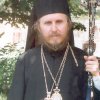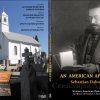Bishop Danilo’s writings, his personal journey, the nuanced theological notions which he attempted to formulate to his disciples and the faithful, testify to an intense theological vision. He took monastic vows in 1960 in St Sava Monastery in Libertyville, IL, and become a priest in 1962. Bishop Danilo was able to magnetically draw his interlocutors into the profundities of his theology.
In 1969 the Holy Assembly of Bishops of the Serbian Orthodox Church appointed him the vicar bishop of the Serbian Patriarch, his official title being the Bishop of Moravice. While being in Belgrade as the vicar bishop of the Serbian Patriarch, he used to incite—mostly by his tremendous erudition and pastoral words—great interest of young intellectuals, especially the students of the University of Belgrade, for the word of God and Christ’s Gospel. From 1984 he was the administrator of the Diocese of Budim, and from 1988 he was appointed the hierarch of the Diocese of Budim, being enthroned in 1990 (in a Diocese that had no bishop for over thirty years).
Numerous theological and literary works of Bishop Danilo are dispersed in many publications, magazines and books, published both in his country and abroad. It is noteworthy that he taught Pastoral theology at the Faculty of Orthodox Theology in Belgrade (from 1993 to 1997) and was one of the founders and the first dean of the Academy of the Serbian Orthodox Church for Arts and Conservation. For twenty years (1971–1991) he was an editor-in-chief of the quarterly Theological Views, published in Serbian (with summaries in English) by the Patriarchate in Belgrade. With Metropolitan Amfilohije he published in 1988 a small catechism Nema lepše vere od hrišćanske (There is no more beautiful Faith than the Christian; in French: Rien n'est plus beau que la foi chrétienne, Paris 2007), while in 1996 a collection of his essays was printed under the title U početku beše Smisao (In the Beginning was Meaning; translated into Russian in 2010). In 1973 he prepared a very popular Serbian edition of The Illustrated Bible for the Youth (Ilustrovana Biblija za mlade).
Bishop Danilo entered into the Kingdom of Heaven on Saturday, April 20, 2002, during the fifth week of Great Lent, in Szentendre.






